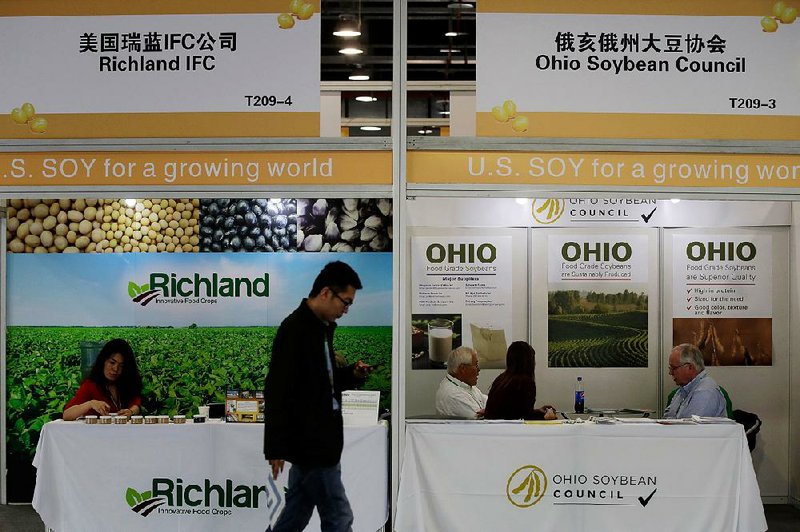WASHINGTON -- With the threat of tariffs and counter-tariffs between Washington and Beijing looming, Chinese buyers are canceling orders for U.S. soybeans.
At the same time, farmers in China are being encouraged to plant more soy, apparently to help make up for any shortfall from the United States.
China has included soybeans on a list of $50 billion of U.S. exports on which it has said it would impose 25 percent tariffs if the United States follows through on its threats to impose the same level of tariffs on the same value of Chinese goods.
It can take a month or longer for soybean shipments to travel from the U.S. to China. Any soybeans en route to China now could be hit by the tariff by the time they arrive.
"The Chinese aren't willing to buy U.S. soybeans with a 25 percent tax hanging over their head," said Dan Basse, president of AgResource, an agricultural research and advisory firm. "You just don't want the risk."
Basse said that it has been roughly three weeks since China has made any major soybean purchases, an unusually long delay.
Some Chinese buyers might be showing support for their government in the trade dispute by turning away U.S. soybeans, Basse said. The dispute may also make it seem too risky to buy from the United States over the long run.
"The United States could lose the reliable supplier label that we've had these many years," Basse said.
Arkansas farmers last year harvested 3.5 million acres of soybeans -- or 178.5 million bushels -- for an average of 50 bushels an acre across 41 counties, according to the University of Arkansas System Division of Agriculture.
Arkansas generally ranks 10th or 11th each year among the nation's soybean-producing states, with an average market value of $1.5 billion a year, or about 4 percent of the nation's total soybean receipts.
The Arkansas Soybean Promotion Board says about 35 percent of the state's soybean crop is exported, with the remainder processed domestically into cooking oil and feed for livestock and poultry.
Data from the U.S. government show that sales of soybeans have fallen from about 255,000 metric tons in the first week of April, when the trade dispute began, to just 7,900 in the week that ended April 26.
Cancellations have also jumped, to more than 140,000 metric tons in the week ending April 26. In the same week last year, there were no canceled sales at all.
Some analysts argue that the shifts aren't yet particularly significant. China buys most of its soybeans from the United States in the late summer and fall, and then switches to South American sources, mainly Brazil and Argentina, in the spring. So the current market activity doesn't necessarily reflect the pattern that would occur during the main buying season.
"These numbers we're talking about are pretty minor," said John Baize, an economist for the U.S. Soybean Export Council.
The U.S. ships about 35 million metric tons of soybeans to China a year, Baize said. China usually imports about 100 million tons a year, and Baize said China can't import enough from other countries to abandon the United States as a source.
"Where's China going to buy its beans?" Baize asked.
That may be true in the short run. But Basse suggests that Brazil has enough land that could be used for soybean cultivation that it could soon mostly replace the United States as a supplier to China.
And if the Chinese market were to be closed to U.S. farmers, they might be able to sell some portion of their soybeans to other markets. Baize said that huge multinational companies, such as Cargill and ADM, might, for example, sell more U.S. soybeans to Europe, where they wouldn't face any tariffs, though this likely wouldn't make up for the loss of the Chinese market.
At the same time, China is looking more to its own farmers. Since China announced its potential tariffs on U.S. soy in April, the government has encouraged farmers to cultivate more soybeans. Beginning this month, Chinese farmers say, Beijing reduced corn subsidies and raised annual soybean subsidies from $162 per acre to $190 or more per acre in major soybean-producing provinces in northeast China.
China's exports rebounded in April, and its politically sensitive monthly trade surplus with the United States grew for the first time in five months as Beijing and Washington haggled over the chronic imbalance.
The data released by China on Tuesday showed its trade surplus with the U.S. totaled $80.4 billion in January-April, up from $50 billion in the same period last year. President Donald Trump's demands that China slash its surplus with the U.S. have become a cornerstone of his economic policy.
In April, the trade surplus with the U.S. swelled to $22.2 billion, up from $15.4 in March and the first increase since November, as exports to the U.S. grew at a double digit pace. China's total exports jumped 21.5 percent in April from the same month the year before, bouncing back from a contraction the previous month thanks to resurgent global demand.
China's Foreign Ministry said that a planned visit by President Xi Jinping's top economic adviser, Liu He, to Washington next week shows the U.S. hopes to "reach a consensus" with Beijing on trade and economic issues.
But a U.S. envoy to the World Trade Organization condemned China's trade policy on Tuesday and said Beijing's exhortations against protectionism have "entered the realm of Alice in Wonderland."
"It is amazing to watch a country that is the world's most protectionist, mercantilist economy position itself as the self-proclaimed defender of free trade and the global trading system," Deputy U.S. Trade Representative Dennis Shea said. "White is black. Up is down."
Information for this article was contributed by Stephen Steed of the Arkansas Democrat-Gazette; by Shanshan Wang, Fu Ting, Kelvin Chan and Paul Wiseman of The Associated Press; and by Bryce Baschuk of Bloomberg News.
Business on 05/09/2018
